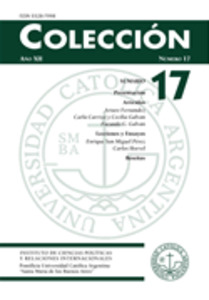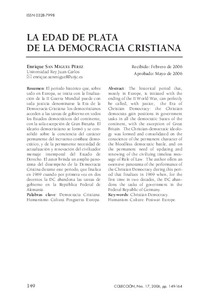Por favor, use este identificador para citar o enlazar este ítem:
https://repositorio.uca.edu.ar/handle/123456789/9875| Campo DC | Valor | Lengua/Idioma |
|---|---|---|
| dc.contributor.author | San Miguel Pérez, Enrique | es |
| dc.date.accessioned | 2020-05-06T00:34:26Z | - |
| dc.date.available | 2020-05-06T00:34:26Z | - |
| dc.date.issued | 2006 | - |
| dc.identifier.citation | San Miguel Pérez, E. La edad de plata de la democracia cristiana [en línea]. Colección. 2006, 12(17). Disponible en: https://repositorio.uca.edu.ar/handle/123456789/9875 | es |
| dc.identifier.issn | 1850-003X (impreso) | - |
| dc.identifier.issn | 0328-7998 (online) | - |
| dc.identifier.uri | https://repositorio.uca.edu.ar/handle/123456789/9875 | - |
| dc.description.abstract | Resumen: El período histórico que, sobre todo en Europ a, se inicia con la finalización de la II Guerra Mundial puede con toda justicia denominarse la Era de la Democracia Cristiana: los democristianos acceden a las tareas de gobierno en todos los Estados democráticos del continente, con la sola excepción de Gran Bretaña. El ideario democristiano se formó y se consolidó sobre la conciencia del carácter permanente del incruento combate democrático, y de la permanente necesidad de actualización y renovación del civilizador mensaje intemporal del Estado de Derecho. El autor brinda un amplio panorama del desempeño de la Democracia Cristiana durante este período, que finaliza en 1969 cuando por primera vez en dos decenios la DC abandona las tareas de gobierno en la República Federal de Alemania. | es |
| dc.description.abstract | Abstract: The historical period that, mostly in Europe, is initiated with the ending of the II World War, can erfectly be called, with justice, the Era of Christian Democracy: the Christian democrats gain positions in government tasks in all the democratic States of the continent, with the exception of Great Britain. The Christian-democratic ideology was formed and consolidated on the conscience of the permanent character of the bloodless democratic battle, and on the permanent need of updating and renewing of the civilizing timeless message of Rule of Law. The author offers an extensive panorama of the performance of the Christian Democracy during this period that finalizes in 1969 when, for the first time in two decades, the DC abandons the tasks of government in the Federal Republic of Germany. | es |
| dc.format | application/pdf | es |
| dc.language.iso | spa | es |
| dc.publisher | Pontificia Universidad Católica Argentina. Facultad de Ciencias Sociales. Departamento de Ciencias Políticas y Relaciones Internacionales | es |
| dc.rights | Acceso abierto | * |
| dc.rights.uri | http://creativecommons.org/licenses/by-nc-sa/4.0/ | * |
| dc.source | Colección. 2006, 12(17) | es |
| dc.subject | DEMOCRACIA CRISTIANA | es |
| dc.subject | PARTIDOS POLITICOS | es |
| dc.subject | ESTADO DE DERECHO | es |
| dc.subject | POSGUERRA | es |
| dc.subject | GUERRA MUNDIAL 1939-1945 | es |
| dc.title | La edad de plata de la democracia cristiana | es |
| dc.type | Artículo | es |
| uca.disciplina | CIENCIA POLITICA | es |
| uca.issnrd | 1 | es |
| uca.affiliation | Fil: Enrique San Miguel Pérez. Universidad Rey Juan Carlos; España | es |
| uca.version | publishedVersion | es |
| item.languageiso639-1 | es | - |
| item.fulltext | With Fulltext | - |
| item.grantfulltext | open | - |
| Aparece en las colecciones: | COL - 2006 Año XII nro. 17 | |
Ficheros en este ítem:
| Fichero | Descripción | Tamaño | Formato | |
|---|---|---|---|---|
| cover_issue_65_es_AR.gif | 7,97 kB | GIF |  Visualizar/Abrir | |
| edad-plata-democracia-cristiana.pdf | 164,95 kB | Adobe PDF |  Visualizar/Abrir |
Visualizaciones de página(s)
277
comprobado en 12-dic-2025
Descarga(s)
297
comprobado en 12-dic-2025
Google ScholarTM
Ver en Google Scholar
Este ítem está sujeto a una Licencia Creative Commons

